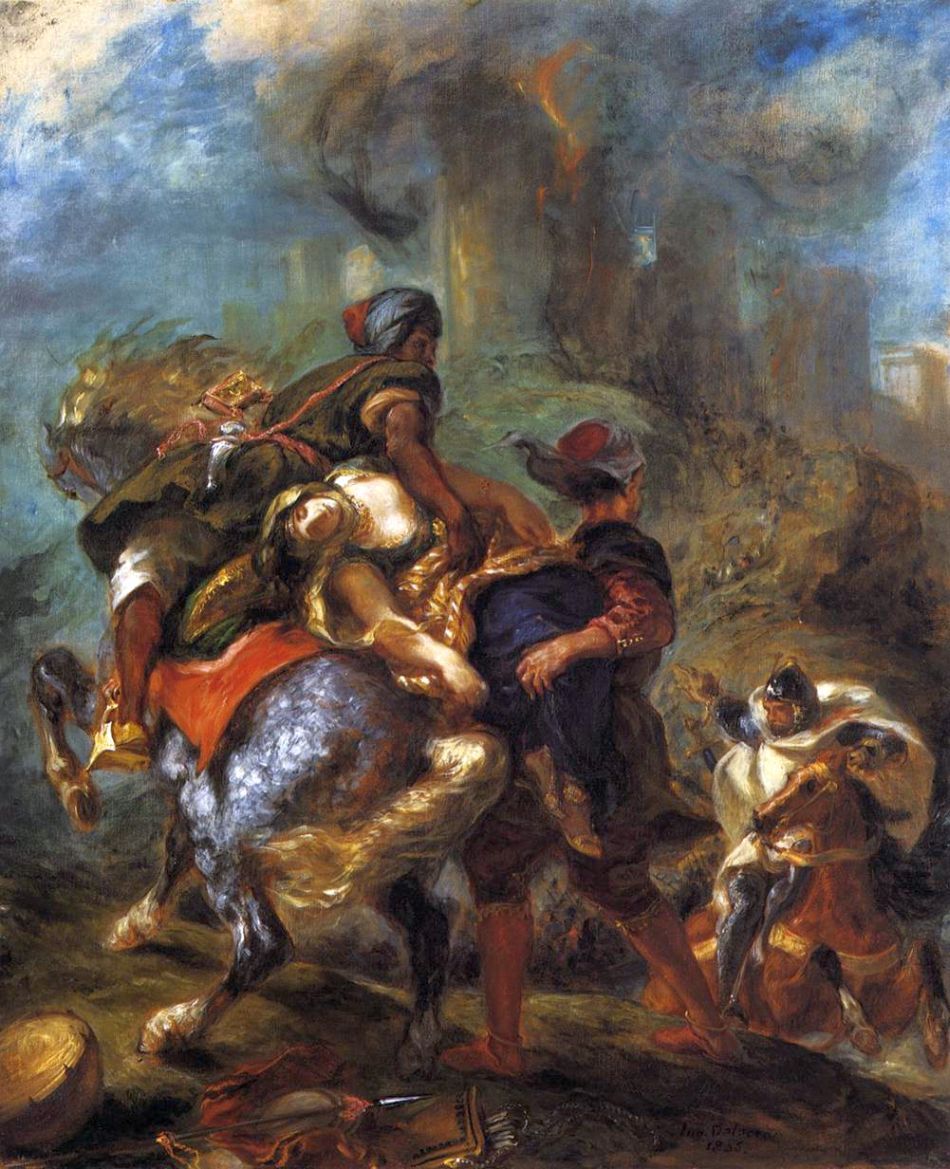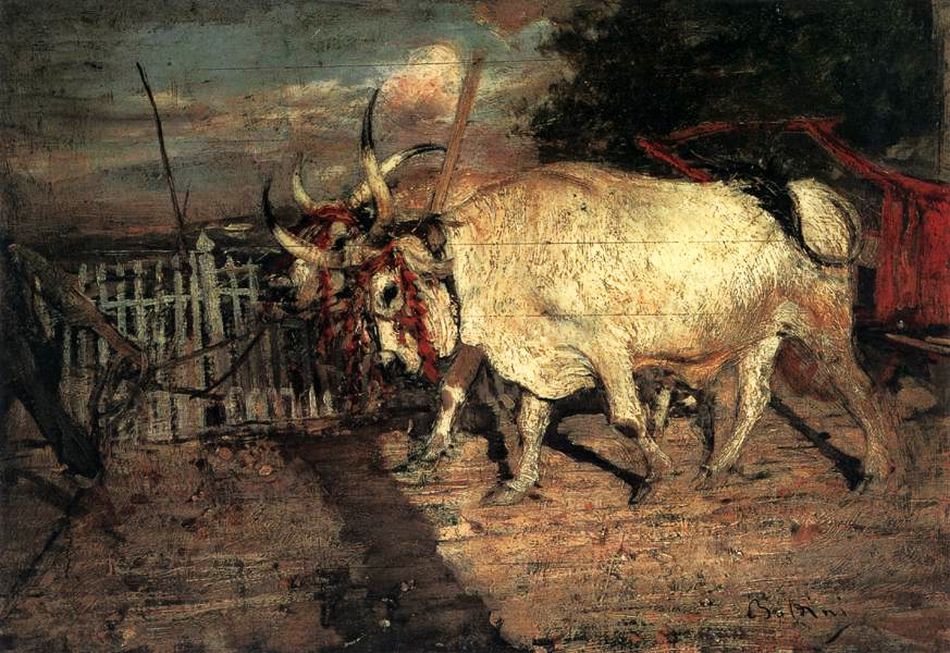DAWN
Daily Arts Web Nucleus
Discover the Arts! Each day a different image from the Literary, Performing, or Visual Arts representing a portion of Scripture plus an explanation with links and a discussion forum 2013 December 21
Image 1: The Abduction of Rebecca (1846)
Eugene Delacroix (1798-1863)
Romanticism Style
The Metropolitan Museum of Art, New York, New York, USA
Image Credit: Web Gallery of Art
~~~~~~~~~~
Image 2: Oxen Pulling a Cart (1885)
Giovanni Boldini (1842-1931)
Realism Style
Galleria dell'Arte Moderna, Palazzo Pitti, Florence, Italy
Image Credit: Web Gallery of Art
Explanation: Matters of personal rights, especially in regard to injury and death, are the focus of Exodus 21, as applied to all levels of society, particularly slaves. These regulations were given just after the giving of the Ten Commandments when the LORD called Moses to hear his laws and bring them to the people of Israel. The LORD told Moses that a Hebrew slave would be required to serve no more than six years and would go out free in the seventh year. If he came in single he would go out single; if he had a wife he could take her with him. But if the master gave him a wife, she and any children she bore in slavery would belong to the master. However a slave could make his slavery permanent if he loved his master, his wife, and his children and wanted to stay with them. In that case, the master would bore his ear through with an awl; and he would be the master's slave forever (1-6). If a man sold his daughter to be a slave, she could not go out as male slaves did. If she did not please her master she could be redeemed, but he could not sell her to a foreigner. If he purchased her for his son, he had to treat her as a daughter. If he took another wife, he could not diminish her rights to food, clothing, or marital relations. If he did not do these things for her, she could leave without paying redemption money (7-11).
Verses 12-36 give some general rules for treating one another correctly. particularly in cases of death and injury, which are then applied, in part, to the treatment of slaves. The first of these are the regulations for murder. A murderer was to be put to death. However, if the death was accidental, the one who killed the other could flee to a city of refuge. If the killing was deliberate, there was no refuge, not even at God's altar (12-14). The death penalty also applied to anyone who struck his father or his mother (15). A manstealer also faced the death penalty (16). Anyone who cursed his father or his mother would be put to death (17). If someone injured another during a fight he had to pay for his lost time and have him thoroughly healed (18-19). When someone killed a slave, the slave was to be avenged; but if the slave survived he was not avenged (20-21). If a premature birth came from a pregnant woman being injured, a fine could be imposed by the husband, as he sees fit; but if harm comes, the penalty will be proportional to the injury -- life for life, eye for eye, tooth for tooth, hand for hand, foot for foot, burn for burn, stripe for stripe (22-25). A slave could go free if he or she was stricken and lost their eye, or if they lost a tooth (26-27). If an ox gored a man or a woman to death the ox would be killed and eaten, but the owner would not liable unless the ox had been known to do this in the past, in which case the ox was to be stoned and the owner put to death. The owner may redeem his life if a ransom was imposed. These rules applied to an ox that gores a man's son or daughter. If it gored a slave, the owner of the ox must pay thirty shekels of silver to the slave's owner, and the ox must be stoned (28-32). If an ox or donkey fell into an uncovered pit the owner must make restitution, but he could keep the dead beast (33-34). If one ox kills another, the live ox must be sold and the money split, and the dead ox would be shared; but if it was prone to gore in the past, the owner must pay ox for ox and could keep the dead ox (35-36).
Exodus 21
1 "Now these are the rules that you shall set before them.
2 When you buy a Hebrew slave, he shall serve six years, and in the seventh he shall go out free, for nothing.
3 If he comes in single, he shall go out single; if he comes in married, then his wife shall go out with him.
4 If his master gives him a wife and she bears him sons or daughters, the wife and her children shall be her master's, and he shall go out alone.
5 But if the slave plainly says, 'I love my master, my wife, and my children; I will not go out free,'
6 then his master shall bring him to God, and he shall bring him to the door or the doorpost. And his master shall bore his ear through with an awl, and he shall be his slave forever.
7 "When a man sells his daughter as a slave, she shall not go out as the male slaves do.
8 If she does not please her master, who has designated her for himself, then he shall let her be redeemed. He shall have no right to sell her to a foreign people, since he has broken faith with her.
9 If he designates her for his son, he shall deal with her as with a daughter.
10 If he takes another wife to himself, he shall not diminish her food, her clothing, or her marital rights.
11 And if he does not do these three things for her, she shall go out for nothing, without payment of money.
12 "Whoever strikes a man so that he dies shall be put to death.
13 But if he did not lie in wait for him, but God let him fall into his hand, then I will appoint for you a place to which he may flee.
14 But if a man willfully attacks another to kill him by cunning, you shall take him from my altar, that he may die.
15 "Whoever strikes his father or his mother shall be put to death.
16 "Whoever steals a man and sells him, and anyone found in possession of him, shall be put to death.
17 "Whoever curses his father or his mother shall be put to death.
18 "When men quarrel and one strikes the other with a stone or with his fist and the man does not die but takes to his bed,
19 then if the man rises again and walks outdoors with his staff, he who struck him shall be clear; only he shall pay for the loss of his time, and shall have him thoroughly healed.
20 "When a man strikes his slave, male or female, with a rod and the slave dies under his hand, he shall be avenged.
21 But if the slave survives a day or two, he is not to be avenged, for the slave is his money.
22 "When men strive together and hit a pregnant woman, so that her children come out, but there is no harm, the one who hit her shall surely be fined, as the woman's husband shall impose on him, and he shall pay as the judges determine.
23 But if there is harm, then you shall pay life for life,
24 eye for eye, tooth for tooth, hand for hand, foot for foot,
25 burn for burn, wound for wound, stripe for stripe.
26 "When a man strikes the eye of his slave, male or female, and destroys it, he shall let the slave go free because of his eye.
27 If he knocks out the tooth of his slave, male or female, he shall let the slave go free because of his tooth.
28 "When an ox gores a man or a woman to death, the ox shall be stoned, and its flesh shall not be eaten, but the owner of the ox shall not be liable.
29 But if the ox has been accustomed to gore in the past, and its owner has been warned but has not kept it in, and it kills a man or a woman, the ox shall be stoned, and its owner also shall be put to death.
30 If a ransom is imposed on him, then he shall give for the redemption of his life whatever is imposed on him.
31 If it gores a man's son or daughter, he shall be dealt with according to this same rule.
32 If the ox gores a slave, male or female, the owner shall give to their master thirty shekels of silver, and the ox shall be stoned.
33 "When a man opens a pit, or when a man digs a pit and does not cover it, and an ox or a donkey falls into it,
34 the owner of the pit shall make restoration. He shall give money to its owner, and the dead beast shall be his.
35 "When one man's ox butts another's, so that it dies, then they shall sell the live ox and share its price, and the dead beast also they shall share.
36 Or if it is known that the ox has been accustomed to gore in the past, and its owner has not kept it in, he shall repay ox for ox, and the dead beast shall be his.
PARTICIPATION: We have 7 areas available (via email) for your participation. We are accepting contributions for Prose, Poetry, Writers, Visual Artists, Music, DAWN, and ILLUMINATION. DAWN, the page you are presently visiting, features a new image daily and invites discussion of the artist, style, or Biblical subjects depicted. ILLUMINATION features a compact, Illuminated Bible for which we are accepting visual, auditory, musical, and written contributions on any Biblical passage or theme. Our goal is to have a community-made, online, Illuminated Bible.
Please Email Comments, Questions, and Contributions for All Areas To
AD LIB ARTS EMAIL
copyright 2013, Scott Souza
|

